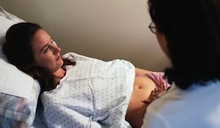 “…this is a profession to be proud of” says Anne Furedi, Chief Executive of the British Pregnancy Advisory Service, referring, in some desperation it would seem, to abortion provision. However a new survey published this week in the Journal of Medical Ethics shows that large numbers of medical students take a very different view to Furedi on abortion.
“…this is a profession to be proud of” says Anne Furedi, Chief Executive of the British Pregnancy Advisory Service, referring, in some desperation it would seem, to abortion provision. However a new survey published this week in the Journal of Medical Ethics shows that large numbers of medical students take a very different view to Furedi on abortion.
The survey of 733 medical students were asked: ‘Do you think that doctors should be entitled to object to any procedure for which they have a moral, cultural or religious disagreement?’ In total, 45% said yes, 40% said no while 14% were unsure.
The survey found almost a half of students objected to abortion for congenital abnormalities after 24 weeks, and nearly a quarter objected to abortion for congenital abnormalities before 24 weeks. A third objected to abortion for failed contraception before 24 weeks and a third also objected to abortion for a raped minor after 24 weeks. The survey questioned how many students would actually perform abortions for the same reasons and gestation, with slightly lower, but still high, numbers who would refuse to do so.
When tabulated against the respondents’ religion three quarters of Muslim students (76%) agreed that doctors had a right to object to any procedure based on their morals or religious beliefs, as did over half of Jewish, Protestant and ‘Other’ students. The proportions of those with other faiths who said ‘yes’, ranged from 34% (Hindu) to 46% (Catholics).
Nevertheless, despite frequent attempts by pro-abortionists – and indeed the media – to suggest that objection to performing abortions is usually equated with religious beliefs, this survey did not back this claim. In fact, it found that a far greater percentage of the objections in the survey were for non-religious reasons than religious ones. Of all the objections raised in the study, 20% were for religious reasons, 44% were for non-religious reasons and 36% were for both religious reasons and non-religious reasons. The study author, Dr Sophie Strickland, acknowledges that it is “perhaps too easy to equate conscientious objection with religious belief.”
This all has interesting implications. It could be argued that perhaps this is a one-off and not necessarily indicative of a longer-term trend. However back in 2007 the Independent ran an article titled “Abortion crisis as doctors refuse to perform surgery”. This was followed up by The Royal College of Obstetricians and Gynaecologists issuing a statement recognising the growing problem of its doctors refusing to train in abortion. It stated that it is: ‘aware of the slow but growing problem of trainees opting out of training in the termination of pregnancy and is therefore concerned about the abortion service of the future.” The Independent article and this new JME article both refer to Department of Health statistics from 2007 which suggested that although there are an increasing number of abortions taking place in the UK, fewer doctors are willing to perform them. This assumption is based on the rising proportion of abortions which are paid for by the NHS but are carried out in the private or charitable sector: in 2010 96% of abortions were funded by the NHS but of these 59% took place in the independent sector under NHS contract.
The JME study author clearly sees the implications of these findings and does not like them. She complains that her survey shows it may be more difficult for women to get abortions in the future because doctors do not want to be forced to be involved. “Once qualified as doctors, if all these respondents acted on their conscience and refused to perform certain procedures, it may become impossible for conscientious objectors to be accommodated in medicine.”
Furthermore, she notes that there are fewer students opting for a career in obstetrics and gynaecology, “which could further complicate the problem”. In 1995, it was the main career choice of 26 out of 545 UK graduates, in 1998 this was 16 out of 509 and by 2002 only six out of 487.
The RCOG has expressed similar concerns in the past, and has tried to understand why these changes are taking place. Distaste at performing terminations combined with ethical and religious convictions has led to a big increase in “conscientious objectors” who request exemption from the task, the RCOG said. A key factor is what specialists call “the dinner party test”. Gynaecologists who specialise in fertility treatment creating babies for childless couples are almost universally revered – but no one boasts of being an abortionist.
Which perhaps all helps to explain the sense of desperation that Anne Furedi expressed in yesterday’s Guardian, when claiming abortion is a profession to be proud of. Back in 2007 Furedi had seen the longer-term implications: “There is a real crisis looming. Unless we can address the problem and motivate doctors to train in abortion, we may well face a situation in five years’ time in which women’s access to abortion is severely restricted. It is our biggest headache.”
All of which is very encouraging for those of us who would love to see abortion becoming rare, and certainly never a profession to be proud of. But we will have to remain vigilant that conscientious objection both retains its support and remains a right for doctors to use.
See also: New Study of Medical Students Reveals a Strong Support for Freedom of Conscience



